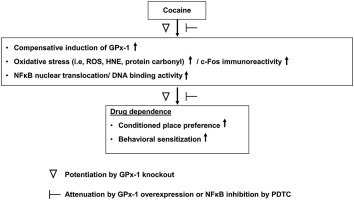当前位置:
X-MOL 学术
›
Neurochem. Int.
›
论文详情
Our official English website, www.x-mol.net, welcomes your
feedback! (Note: you will need to create a separate account there.)
Glutathione peroxidase-1 overexpressing transgenic mice are protected from cocaine-induced drug dependence.
Neurochemistry international ( IF 4.4 ) Pub Date : 2019-01-24 , DOI: 10.1016/j.neuint.2019.01.018 Huynh Nhu Mai 1 , Yoon Hee Chung 2 , Eun-Joo Shin 1 , Dae-Joong Kim 3 , Naveen Sharma 1 , Yu Jeung Lee 4 , Ji Hoon Jeong 5 , Seung-Yeol Nah 6 , Choon-Gon Jang 7 , Hyoung-Chun Kim 1
Neurochemistry international ( IF 4.4 ) Pub Date : 2019-01-24 , DOI: 10.1016/j.neuint.2019.01.018 Huynh Nhu Mai 1 , Yoon Hee Chung 2 , Eun-Joo Shin 1 , Dae-Joong Kim 3 , Naveen Sharma 1 , Yu Jeung Lee 4 , Ji Hoon Jeong 5 , Seung-Yeol Nah 6 , Choon-Gon Jang 7 , Hyoung-Chun Kim 1
Affiliation

|
Converging evidence has demonstrated that oxidative burdens are associated with drug dependence induced by psychostimulants. Here, we investigated whether oxidative stress directly mediates conditioned place preference and behavioral sensitization (drug dependence) induced by cocaine and whether glutathione peroxidase-1 (GPx-1), a major GPx, modulates cocaine-induced psychotoxic changes in mice. Cocaine-induced drug dependence was followed by increases in c-Fos-immunoreactivity (c-Fos-IR) in the nucleus accumbens. Simultaneously, cocaine significantly increased oxidative parameters and nuclear factor κB (NFκB) activity (i.e. nuclear translocation and DNA binding activity) in the striatum (including nucleus accumbens). Genetic depletion of GPx-1 made mice susceptible to drug dependence induced by cocaine in mice, while genetic overexpression of GPx-1 protected the mice from drug dependence. Pyrrolidine dithiocarbamate (PDTC), a NFκB inhibitor, significantly attenuated the sensitivity induced by the genetic depletion of GPx-1 in mice. However, PDTC did not exhibit any additive effects against the protection afforded by the genetic overexpression of GPx-1. Our results suggest that drug dependence induced by cocaine requires oxidative stress and NFκB activation, and that the GPx-1 gene is a potential protective factor against cocaine-induced drug dependence through positive modulation of NFκB.
中文翻译:

谷胱甘肽过氧化物酶-1过表达的转基因小鼠受到保护,免受可卡因诱导的药物依赖性。
越来越多的证据表明,氧化负荷与精神刺激药诱导的药物依赖性有关。在这里,我们调查了氧化应激是否直接介导了可卡因引起的条件性位置偏爱和行为敏化(药物依赖性),以及主要的GPx谷胱甘肽过氧化物酶1(GPx-1)是否调节了可卡因引起的小鼠精神毒性变化。可卡因诱导的药物依赖性随后是伏伏核中c-Fos-免疫反应性(c-Fos-IR)的增加。同时,可卡因显着增加了纹状体(包括伏隔核)中的氧化参数和核因子κB(NFκB)活性(即核转运和DNA结合活性)。GPx-1的遗传耗竭使小鼠容易受到可卡因诱导的药物依赖性,而GPx-1的基因过度表达可保护小鼠免受药物依赖性。吡咯烷二硫代氨基甲酸酯(PDTC)是一种NFκB抑制剂,可显着降低GPx-1的遗传耗竭所致小鼠的敏感性。但是,PDTC对GPx-1基因过表达所提供的保护作用没有表现出任何累加作用。我们的结果表明,可卡因诱导的药物依赖性需要氧化应激和NFκB激活,而GPx-1基因是通过可调节的NFκB抵抗可卡因诱导的药物依赖性的潜在保护因子。PDTC对GPx-1的基因过表达所提供的保护没有表现出任何累加作用。我们的结果表明,可卡因诱导的药物依赖性需要氧化应激和NFκB激活,而GPx-1基因是通过可调节的NFκB抵抗可卡因诱导的药物依赖性的潜在保护因子。PDTC对GPx-1的基因过表达所提供的保护没有表现出任何累加作用。我们的结果表明,可卡因诱导的药物依赖性需要氧化应激和NFκB激活,而GPx-1基因是通过可调节的NFκB抵抗可卡因诱导的药物依赖性的潜在保护因子。
更新日期:2019-01-24
中文翻译:

谷胱甘肽过氧化物酶-1过表达的转基因小鼠受到保护,免受可卡因诱导的药物依赖性。
越来越多的证据表明,氧化负荷与精神刺激药诱导的药物依赖性有关。在这里,我们调查了氧化应激是否直接介导了可卡因引起的条件性位置偏爱和行为敏化(药物依赖性),以及主要的GPx谷胱甘肽过氧化物酶1(GPx-1)是否调节了可卡因引起的小鼠精神毒性变化。可卡因诱导的药物依赖性随后是伏伏核中c-Fos-免疫反应性(c-Fos-IR)的增加。同时,可卡因显着增加了纹状体(包括伏隔核)中的氧化参数和核因子κB(NFκB)活性(即核转运和DNA结合活性)。GPx-1的遗传耗竭使小鼠容易受到可卡因诱导的药物依赖性,而GPx-1的基因过度表达可保护小鼠免受药物依赖性。吡咯烷二硫代氨基甲酸酯(PDTC)是一种NFκB抑制剂,可显着降低GPx-1的遗传耗竭所致小鼠的敏感性。但是,PDTC对GPx-1基因过表达所提供的保护作用没有表现出任何累加作用。我们的结果表明,可卡因诱导的药物依赖性需要氧化应激和NFκB激活,而GPx-1基因是通过可调节的NFκB抵抗可卡因诱导的药物依赖性的潜在保护因子。PDTC对GPx-1的基因过表达所提供的保护没有表现出任何累加作用。我们的结果表明,可卡因诱导的药物依赖性需要氧化应激和NFκB激活,而GPx-1基因是通过可调节的NFκB抵抗可卡因诱导的药物依赖性的潜在保护因子。PDTC对GPx-1的基因过表达所提供的保护没有表现出任何累加作用。我们的结果表明,可卡因诱导的药物依赖性需要氧化应激和NFκB激活,而GPx-1基因是通过可调节的NFκB抵抗可卡因诱导的药物依赖性的潜在保护因子。









































 京公网安备 11010802027423号
京公网安备 11010802027423号